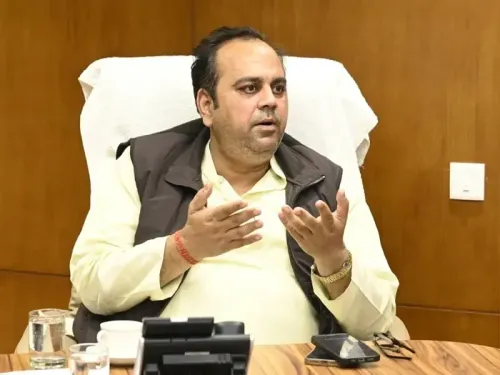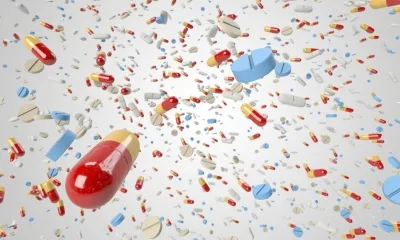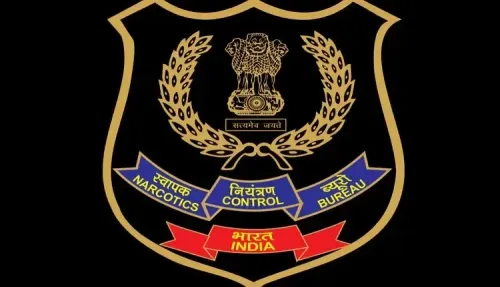Why Did Rajasthan Ban 7 Firms and 40 Medicines in 2025?

Synopsis
Key Takeaways
- Zero-tolerance policy against negligence in healthcare.
- Unprecedented bans on seven firms and 40 medicines in 2025.
- Commitment to quality healthcare under the Free Medicine Scheme.
- Stringent measures against substandard pharmaceutical products.
- Robust quality-testing mechanisms in place.
Jaipur, Nov 20 (NationPress) The Rajasthan Medical and Health Department is amplifying its efforts to enhance the quality of healthcare and provide improved services to the public by implementing a zero-tolerance policy against any form of negligence or irregularities.
The department has embarked on a groundbreaking initiative to ensure the availability of high-quality medicines under the Chief Minister's Free Medicine Scheme.
This year, the Rajasthan Medical Services Corporation (RMSC) has banned a total of seven firms and 40 medicines after inspections revealed they did not comply with the required quality standards—marking the largest enforcement action since the Corporation's inception.
Medical and Health Minister Gajendra Singh Khinvsar emphasized that while the operational flow of the Free Medicine Scheme is crucial, supplying only standard-quality medicines remains paramount.
He noted that stringent measures are being enforced against companies that fail to adhere to quality guidelines, resulting in the ban of seven firms and 40 products in 2025, a record for the corporation.
Principal Secretary Gayatri Rathore pointed out that only 26 companies were banned between 2011-12 and 2024-25. In stark contrast, seven pharmaceutical companies have already faced bans in the financial year 2025-26 for either supplying or failing to supply substandard medicines.
This year alone, 40 medicines have been banned—again, the highest in any financial year. Additionally, penalties have been imposed in six instances.
RMSC Managing Director Pukhraj Sen elaborated that the Corporation has instituted a robust quality-testing framework to prevent inferior medicines from reaching healthcare facilities.
All medicines sourced from suppliers are initially quarantined at district drug stores. Each batch undergoes testing by RMSC-approved laboratories. Only those batches that meet quality criteria are released for distribution to hospitals via the e-medicine system. Batches deemed substandard by authorized labs are promptly rejected.
Should a drug sample fail initial testing, it is forwarded to the State Drug Testing Laboratory for further confirmation. A notification is also dispatched to the Drug Controller, who collects independent samples from district drug stores for testing at the state laboratory.
In addition to RMSC's testing, district drug control officers also conduct random sampling. Once a substandard report is confirmed, the case is referred to the Disciplinary Committee. The implicated firm is notified and allowed to present its case.
Based on the findings, the Committee may debar or penalize the firm or product in accordance with guidelines regarding tender violations, blacklisting, and debarment.
This year, the corporation has debarred five firms for five years for supplying substandard or adulterated medicines, including M/s Arien Healthcare for Ciprofloxacin and Dexamethasone Eye/Ear Drops, M/s Agron Remedies Pvt. Ltd for Cefuroxime Axetil Tablets, Tobramycin Eye Drops, M/s Effi Parenterals for Calcium and Vitamin D3 Tablets, Jpee Drugs for Calcium and Vitamin D3 Suspension, and Sai Parenterals Ltd for Heparin Sodium Injection. Additionally, two other firms have been banned for three years for breaching service conditions: M/s Biogenetic Drugs Pvt. Ltd and M/s Smilex Healthcare Drug Company.
A total of 40 medicines have been banned from sale and marketing following tests that confirmed they were substandard. These include: Primaquine Tablets from M/s Maxwell Life Sciences Pvt. Ltd. and M/s Scott Edil Pharmacia Ltd, Heparin Sodium Injection and Calcium & Vitamin D3 Suspension from M/s Yakka Pharmaceuticals Pvt. Ltd. (banned for three years), Fexofenadine Tablets from M/s Santlife Pharmaceuticals Ltd, Levetiracetam Tablets and Clopidogrel + Aspirin Tablets from M/s Life Max Cancer Laboratories, and Calcitriol Capsules from M/s Titanium Technologies (India) Pvt. Ltd, among others.










